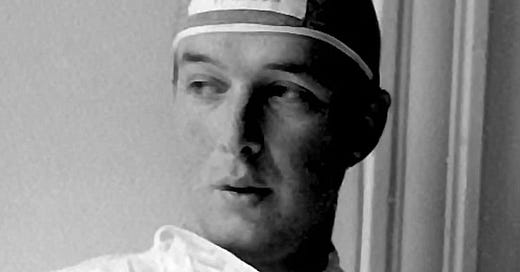During his years at Harvard college, Michael Crichton wanted to be a writer. “But then I read that only two hundred writers in America support themselves writing. I thought, ‘That’s an awfully small group.’ I didn’t want to be a part-time writer with a day job—that didn’t interest me. I either had to be one of those two hundred people or forget it. So I decided to become a doctor.”
By the time Michael Crichton entered medical school (also at Harvard), the United States employed more physicians than workers in the steel industry, automotive manufacturing, or railroads. If writing was a long shot, practicing medicine was a sure thing.
Medicine was booming in the 1960s. CPR, defibrillators, ICUs, organ transplants: these were all new or developing when Crichton studied medicine (he attended Harvard Medical School from 1964-1969). The pharmaceutical industry exploded. Medicare was signed into law in 1965. The first heart transplant was performed in 1967. Crichton was all HELL YEAH. Until he wasn’t.
“I was attracted to medicine partly because I thought I would be doing useful work, helping people—I would never have to wonder if the work was worthwhile. But many working physicians are not convinced at all. They have all kinds of doubts, which troubled me. I also found that I was at odds with the thrust of the profession at the time, which was highly scientific medicine: the physician as technician and the patient as biological machine that was broken. I didn’t find it appealing to work in that kind of setting.”
So Crichton never practiced medicine, not for a day. He wrote The Andromeda Strain while in medical school and sold the movie rights during his senior year. Why toil away in residency if you have a MOVIE DEAL? No doubt he was a flaky medical student, constantly with his head in the clouds, imagining the next scene. I can picture him in the OR, his attending shouting at him not to call DeBakey forceps “tweezers.”
As a medical student, my white coat pockets were always full of gauze and sutures. When the surgeon said jump, I was already in the air. I remember once getting pimped to name the artery of Adamkiewicz during a case in the OR and I nailed it. But I sure never wrote a freaking bestseller in the middle of it all.
"About two weeks into medical school I realized I hated it,” Crichton said. “This isn't unusual since everyone hates medical school – even happy, practicing physicians." I wish I knew someone like him in medical school, someone to say This is every bit as hard as it feels right now. Let’s go write together and have a beer.
Michael Crichton wrote 26 novels, collectively selling more than 200 million copies worldwide, at least half of them adapted to screen. In addition to the Jurassic Park franchise, Crichton is responsible for Westworld and ER. He published his first article in The New York Times at age 16. He wrote a book about his friend Jasper Johns, critiqued Kurt Vonnegut in The New Republic, and was named among People magazine’s 50 most beautiful people in 1992 (the list was tight that year, topped by Cindy Crawford and sprinkled with the likes of Iman, Antonio Banderas, Mel Gibson, and JFK Jr.). He married five times and fathered two children before he died of lymphoma in 2008 at age 66.
“The only other doctor I know of who’s done the same thing [left medicine to become a filmmaker], Jonathon Miller, has said something which I think is true — namely, that being a doctor is good preparation for this, because it teaches you to deal with the kind of life that you will inevitably have. It teaches you to work well when you haven’t had enough sleep. It teaches you to work well when you’re on your feet a lot. It teaches you to work well with technical problems and it teaches you to make decisions and then live by them. . .You’ve got to be able to analyze just what kind of person you’re dealing with. . . Those decisions get to be very important and training to be a doctor builds up that capability for assessing people rapidly which is necessary when it comes to working with actors. I’m not quite sure just how the transition from medicine to movies came about, except, as I’ve said, that I think I’ve always wanted to make movies. When I got into medicine, I was disappointed in a lot of ways, so it was a pull from one direction and a push from the other.”
Perhaps next week I’ll write about Jonathon Miller. In the meantime, be well and do what you love. And if writing seems too hard, there’s always medical school.





